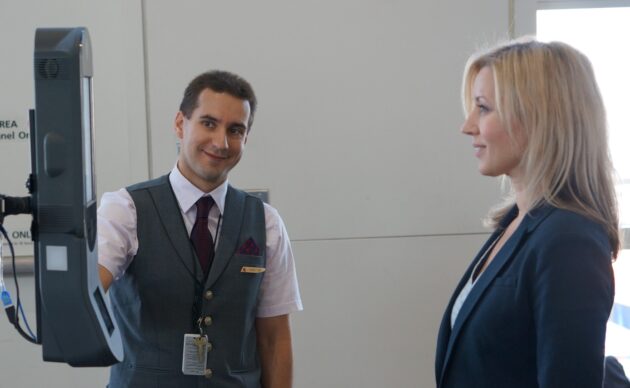
The Port of Seattle established new rules governing the use of biometric screening Tuesday amid an ongoing global debate over facial recognition technology.
The vote comes as civil rights groups pressure government agencies across the country to get their arms around biometric screening. Meanwhile, U.S. Customs and Border Protection is scrambling to implement a federal mandate that requires facial recognition screening for “100 percent of all international passengers” by 2021.
The new principles will guide the port as it reviews proposals to implement technologies like facial recognition and fingerprint screening at the Seattle-Tacoma International Airport and other entry points. The new principles do not, however, apply to federal agencies that handle most traveler screening.
Port of Seattle will consider whether proposals to use biometric screening comply with these guidelines:
- Justified: Biometric screening is only used for a “clear intended purpose that furthers a specific operational need” and not for “mass surveillance.”
- Voluntary: Travelers should be able to opt-in or opt-out of biometric screening.
- Private: Port officials should limit the collection and storage of traveler data through biometric screening and should not share it with third-parties without “clear and informed consent.”
- Equitable: Biometric screening technology should be “reasonably accurate in identifying people” and the port should have systems for dealing with misidentification “with proper cultural sensitivity.”
- Transparent: Port officials should notify passengers when biometric screening is in place
- Lawful: Biometric screening should comply with all local and federal laws
- Ethical: Port officials should respect principles such as “honesty, fairness, equality, dignity, diversity and individual rights” when deploying biometric screening
The port will launch a new approvals process to ensure public-facing uses of biometric screening comply with the principles.
The new guidelines don’t apply to federal agencies like the Transportation Security Administration (TSA) or Coast Guard. Port officials say they’ll communicate their desired standards to those agencies and lobby Congress for federal guardrails.
Customs and Border Protection is in the process of implementing biometric screening at airports for international travelers visiting the U.S. The Port of Seattle expects facial recognition screening to be in place “for almost all arriving passengers (other than those U.S. citizens who opt-out)” at Sea-Tac.
Last week the Department of Homeland Security walked back a proposal to expand face recognition screening to U.S. citizens arriving and departing the country. The agency was considering making face scans mandatory for U.S. citizens — in addition to foreign-born travelers — to the consternation of civil rights groups.
“This proposal never should have been issued, and it is positive that the government is withdrawing it after growing opposition from the public and lawmakers,” said ACLU Senior Policy Analyst Jay Stanley in a statement. “But the fact remains that the agency attempted to renege on what was already an insufficient promise, and has not yet committed to ensuring that immigrants will not be forced to submit to this program.”

Airlines are also rolling out biometric screening across the country. Delta Airlines launched its first facial recognition screening system in 2018 and plans to deploy the technology at Sea-Tac. Speaking at a Port of Seattle hearing in September, Delta’s director for passenger facilitation, Jason Hausner, said that the program has been a success. Fewer than 2 percent of passengers opt-out of biometric screening and it has increased boarding speed by about 10 percent during peak times, he said.
Another private company, Clear, has deployed biometric screening at Sea-Tac and other airports, allowing passengers who subscribe to the service to skip TSA security lines.
Port commissioners voted Tuesday to create a working group that will submit additional recommendations for the use of biometric screening next year.
“These principles will apply until a more comprehensive policy is put in place, through the working group process,” the commission said.
Civil liberties and privacy watchdogs say widespread use of facial recognition by government agencies or in commercial settings could turn the places we live into invasive surveillance states. The ACLU in late October filed a lawsuit against the FBI, Department of Justice and the U.S. Drug Enforcement Agency, seeking information regarding their use of facial recognition and biometric identification technologies.
Officials in Portland, Ore. are considering legislation that would not only prohibit city government agencies from acquiring or employing facial recognition technology — like other cities such as San Francisco, Calif. and Somerville, Mass. have done — but also outlaw business and private use.
